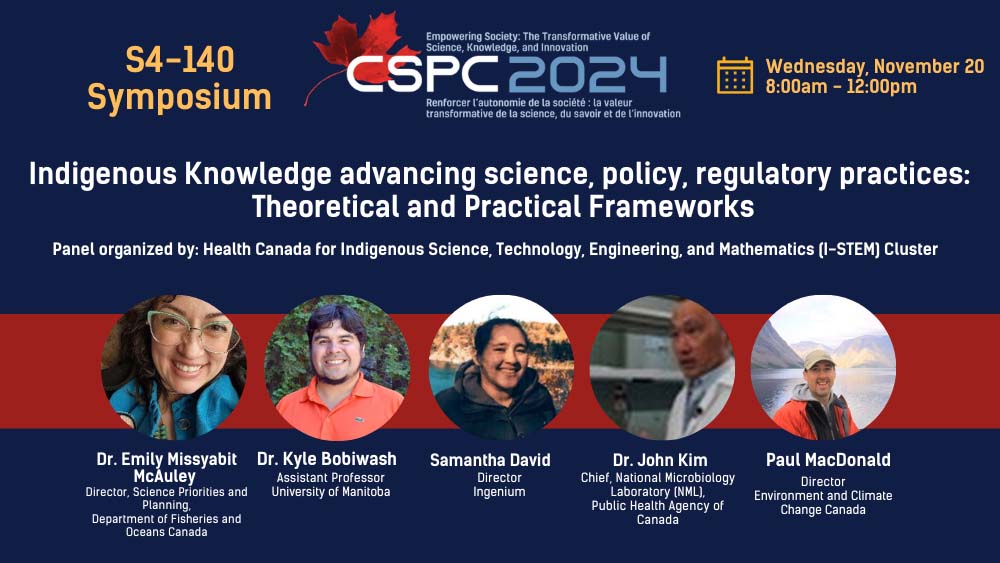Symposium: S4-140
Indigenous Knowledge advancing science, policy, regulatory practices: Theoretical and Practical Frameworks
Abstract:
This panel aims to explore the trajectory and readiness of Canada’s regulatory science system to benefit from Indigenous Knowledge (IK), emphasizing the importance of understanding the technical foundations of regulatory science to fully appreciate the value that IK can add. While there is substantial discussion about weaving or bridging IK into academic and discovery sciences, the conversation around inclusion of IK into regulatory science remains limited. Canada’s regulatory landscape is shaped by distinct worldviews. Although regulatory science faces distinct challenges such as legal considerations and political influences, these barriers can be transformed into opportunities for innovation and collaboration. By understanding these barriers, the panel seeks to explore opportunities to bridge, weave, or braid IK into regulatory decision-making, highlights the steps needed to prepare for this collaborative environment, and suggests ways to advance the dialogue. A couple of case studies on regulatory processes and community collaboration will be presented, showcasing the potential for bridging/weaving IK into regulatory activities and the societal benefits of this synergy.
Summary of Conversations
The panel explored integrating Indigenous knowledge and science into regulatory practices, emphasizing the importance of understanding diverse worldviews and knowledge systems. It highlighted the historical oppression of Indigenous knowledge and the need for reconciliation through ethical engagement and respect. The discussion covered terminology nuances (bridging, braiding, weaving), urging caution against assimilation-driven integration. Real-world examples illustrated successful collaborations, underscoring the significance of relationship-building and community involvement. The panel also addressed challenges within governmental structures and funding systems that hinder interdisciplinary approaches and equitable partnerships with Indigenous communities, calling for systemic changes to support inclusive science.
Take Away Messages/Current Status of Challenges
Key takeaways and challenges include:
- Acknowledge the plurality of Indigenous knowledge systems and their intrinsic link to language and culture.
- Address the historical trauma and ongoing oppression of Indigenous knowledge in Western scientific narratives.
- Recognize Indigenous science as a distinct yet complementary methodology, not requiring validation by Western standards.
- Overcome systemic barriers in funding structures and timelines that impede effective collaboration and equitable partnerships.
- Bridge the gap between regulatory expectations and the pace of actual change in integrating Indigenous knowledge.
- Counteract siloed governmental structures that hinder interdisciplinary approaches necessary for holistic solutions.
- Shift focus towards restoring relationships between people and the environment, recognizing interconnectedness.
- Address capacity limitations at the community level resulting from increasing demands for Indigenous involvement.
Recommendations/Next Steps
Recommended actions and strategies:
- Prioritize relationship-building with Indigenous communities as foundational to collaborative efforts.
- Promote knowledge diplomacy, fostering mutual respect and learning between Indigenous and Western knowledge systems.
- Advocate for flexible funding mechanisms that support interdisciplinary research and long-term community engagement.
- Compensate Indigenous knowledge keepers and experts appropriately for their time and contributions.
- Incorporate Indigenous perspectives in defining health and well-being beyond the absence of illness.
- Decolonize regulatory processes by dismantling colonial structures and empowering Indigenous leadership.
- Treat Indigenous knowledge and data with the same reverence as biological specimens, ensuring their ethical handling and return.
- Prepare researchers to engage respectfully with communities, acknowledging not everyone is suited for this work.
* This summary is generated with the assistance of AI tools


